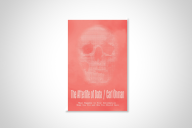You have /5 articles left.
Sign up for a free account or log in.
Thursday was a long day -- one spent with my brain marinating in historiography. I passed the morning with a stack of JSTOR printouts about Richard Hofstadter, whose The American Political Tradition (1948) still sells about 10,000 copies a year. Hofstadter died in 1970. Enough time has passed for his reputation to have been overthrown, restored, and overthrown again. (As someone who grew up listening to theories about the JFK assassination on talk radio in Texas, I can take anti-Hofstadter revisionism seriously only up to a certain point. The man who wrote a book diagnosing The Paranoid Style in American Politics seems like a strong candidate for immortality.)
Only now is there a full-length treatment of his life, Richard Hofstadter: An Intellectual Biography by David S. Brown, just published by the University of Chicago Press. Asked by a magazine to review it, I have been going over the footnotes and making a long march through the secondary literature. Which is easier than writing, of course, and a lot more fun -- the kind of serious-minded procrastination that requires hours. It sure ate up the morning.
Then, after lunch, I headed over the Washington Hilton to pick up press credentials for the annual convention of the Organization of American Historians. Tens of thousands of bloodthirsty jihadist-commie professors are infesting the nation’s campuses, as you have probably been reading of late -- with the historians being a particularly vile lot, turning almost the entire discipline into one big Orwellian indoctrination camp. “Now this,” I thought, “I gotta see.”
Going over the program, it was particularly interesting to notice a session called “The Creation of the Christian Right.” If the rumors were even half true, it would be one long rant against the Bush administration. Each paper would (to renew the Orwell bit) provide the standard Fifteen Minutes Hate, right?
Maybe that should be Twenty Minutes. Who ever keeps within time limits?
Actually, no. Everybody was calm and nobody ran over. The first paper looked at how Protestant and Roman Catholic social conservatives overcame their mutual distrust during the 1950s. Another analyzed the relationship between Billy Graham and Richard Nixon. The third and final presentation argued that the anti-abortion movement played a very minor role in defining the conservative agenda until it got a plank on the GOP’s platform in 1976. (That same year, when Betty Ford told a New York Times reporter that she considered the Roe v. Wade decision to be a fine thing, her comment appeared in the 20th paragraph of an article appearing on page 16 of The New York Times. A First Lady from the GOP making that statement anytime since then would have gotten a little more attention.)
Each presentation was the work of someone who had done substantial work among primary sources, including archival material. The researchers were alert to how the different factions and constituencies of the conservative movement interacted with one another.
But fervor, condemnation, editorializing by proxy? Not a bit of it.
For that matter, you couldn’t even hear the sort of ironic disdain that Hofstadter, writing decades ago, brought to analyzing McCarthyism or the Goldwater campaign. That tone had reflected the Mencken-esque judgement that American conservatism was just another manifestation of boobery and yahooism.
It was puzzling. If ever a session seemed likely to provide a concentrated dose of jihadist-commie propaganda, it would be one called “The Creation of the Christian Right.” Chances are, the young scholars giving papers did have political opinions. But they did not use the podium as a soapbox.
I guess they had been brainwashed by the OAH into practicing the most disinterested, rigorous sort of professional historical inquiry. Apart from being dangerous, those professors sure are sneaky. You’d almost think they were trying to make somebody look like a boob and a yahoo.
Later, another panel discussed the history of the idea of "the liberal establishment." Once again, I went expecting a strident call to destroy the Great Satan of the American Empire. And once again, it was all careful research and calm reason -- despite the fact that the scholar invited to respond to the papers was Michael Kazin, who had even made Horowitz’s list.
Between sessions, there was time to visit the exhibit hall. It was a chance to gaze upon recent offerings from the university presses. All the while, a small but very persistent voice whispered in my ear. “You don’t need more books,” the voice said. “Where would you put them?”
It sounded a lot like my wife.
Other conference-goers were wandering aisles, men and women of all ages; and some bore expressions suggesting that they, too, received similar wireless transmission from significant others back home. And yet those people picked up the new books, even so. I took courage from their example.
That evening, at a Chinese restaurant a few blocks downhill, I joined a group of convention-goers, most of them associated with Cliopatria, the group blog published by the History News Network. The gathering was all "off the record" -- an occasion for conviviality, rather than for news-gathering. But the relaxed flow of the proceedings took an odd turn around the time the main course arrived.
That was when someone indicated that it might be time for historians to work on a topic that I know rather well -- that, indeed, I had witnessed and to some degree participated in. And that was the late and much-lamented magazine Lingua Franca, the subtitle of which called it “The Review of Academic Life.”
That day, on the Web site of The New York Observer, there had appeared an essay on LF by Ron Rosenbaum -- the author of, among other things, a brilliant and unnerving book called Explaining Hitler.
In his piece, Rosenbaum lauded the magazine as a place that did not merely report on university life, but encouraged "thinking about the nature of human nature and human society, the nature of the cosmos, the nature of the mind itself (thinking about factors that underlie all politics)." Similar tributes were being offered around the table as the dishes were delivered. Somebody compared LF to Partisan Review. One historian suggested that it was time for a monograph.
Meanwhile I chewed my tongue quietly. Between 1995 and 2001, I had been a regular contributor to the magazine. Not that many publications with large audiences would let you write about the literary criticism of Northrop Frye, the philosophical architectonics of Richard McKeon, or the strange little pamphlet that Immanuel Kant wrote about the mystical visions of Emmanuel Swedenborg. Even fewer would then pay you. Now it molders in “the elephants’ graveyard of dead magazines.”
Elephants are supposed to have powerful memories, of course. Now it seems to be time for the historians of journalism to do the remembering. But when I look back at that period, it’s not to recall the glory days. There are too many recollections of botched opportunities and missed deadlines, and the occasional wince-inducing editorial decision. A few droplets of bad blood are sprayed across the sepia-toned mental snapshots. If I tried to write about LF, the result would probably be a satirical novel instead of a eulogy.
It might sound vaguely flattering to imagine that part of one’s own experience will probably, sooner or later, be studied by intelligent people. But in fact it is a little disconcerting.
Scholars will notice aspects of the past that you did not. There will be things charged with indelible personal significance for you that nobody else will recognize. It is hard not to cling to those nuances. To assume that you have a privileged relationship to the past, simply by virtue of having been there. But that’s not how history works.
No, the right attitude is probably the one cultivated by Richard Hofstadter. He was a master at grasping the paradoxes defining his discipline. Few writers have better captured the gap between what people in the past [ital]thought[ital] they were doing, on the one hand, and what their actions actually meant, on the other.
Hofstadter once cited a passage from Nietzsche that summed up his own outlook. “Objection, evasion, joyous distrust, and love of irony are signs of health,” the quotation ran. “Everything absolute belongs to pathology.” It’s worth keeping in mind when in thinking about the private history called memory -- not to mention the yet-unwritten history whizzing past, every hour of every day.
A young Web designer named Aaron Swartz has now created a mirror of the long-defunct Lingua Franca Web site.
For a considerably less impressionistic account of the convention, check out Rick Shenkman’s fine roundup of OAH.








